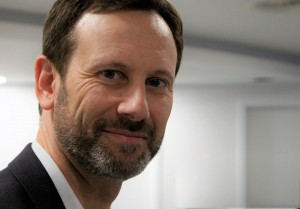Swindon business leaders have called on Chancellor Philip Hammond to go all out to boost confidence ahead of Brexit as he prepares to deliver his first Autumn Statement tomorrow.
With the economic climate expected to get decidedly chilly next year as the UK works towards leaving the EU, commentators are expecting the Chancellor, pictured, to boost spending on infrastructure and introduce measures to help those who feel left behind – the Jams, or individuals and families who are just about managing.
With last week’s jobs figures showing unemployment continuing to fall – in the South West it inched down by 0.1% to 109,000 or 3.9%, well below the national average – Mr Hammond can point to a robust economy even in the wake of the EU referendum.
But Business West – the region’s largest business group and the organisation behind the Swindon & Wiltshire Initiative – called on the Chancellor to “concerted action . . . to boost confidence”.
Managing director Phil Smith, pictured below, said: “These latest figures show the jobs market in the South West continued to hold firm over the summer and remains a source of strength for our region.
 “While these figures are to be welcomed, now is no time for complacency. The rate of job growth slowed over this period and, as the labour market shows signs of tightening, employers across the West Country may well begin to see issues around skills availability and wage pressures emerging.
“While these figures are to be welcomed, now is no time for complacency. The rate of job growth slowed over this period and, as the labour market shows signs of tightening, employers across the West Country may well begin to see issues around skills availability and wage pressures emerging.
“In a period still marked by unprecedented uncertainty, and with economic growth expected to slow in 2017, businesses want to see concerted action from government to boost confidence.
“The Chancellor has the opportunity to deliver just that, and to pull out all the stops to support business confidence. Only then will firms across our region be best placed to repay him with investment, hiring and growth.”
Swindon accountancy firm Regulatory Accounting is calling on Mr Hammond to use the Autumn Statement to support businesses.
Accounts director Jon Lacey, pictured below, said: “The Chancellor has already said he is not sticking to George Osborne’s promises about balancing the budget, so that does give him something to play with,” he said.
“He is expected to honour the commitment to reduce corporation tax to 17% by April 2020, but it’s likely he will distance himself from the promise to bring it down to 15%.
“Despite the announced deferral of part of the electrification of the Cardiff-to-London train route, we’d like to see further smaller-scale investment in infrastructure, like roads and rail. 
“A reduction in fuel duty would also help businesses and individuals, and would be particularly welcome in the face of rising fuel prices.”
Jon also said he’d like to see measures to ease the housing shortage. “Recent changes in Irish tax law may give the Chancellor scope to roll back George Osborne’s landlord taxes that have had little effect on the affordability or availability of housing or rent levels,” he said.
“The announced multi-billion pound building fund should have a greater effect on the housing market and we’d like to see this targeted at local developers.
“Longer term, the Institute of Economic Affairs has also asked for a long-overdue simplification of the UK tax system. This may include a review of VAT, which has been seen as a European tax and rife for change post-Brexit.”
Regulatory Accounting managing director Richard Mathews will give an analysis of the Autumn Statement at a meeting of Swindon networking group Business Village this Thursday.
The meeting includes breakfast and runs from 7.30-9am. For more information and to book, visit www.businessvillage.org.
Optimism among the West of England’s SMEs has recovered since the shock of the Brexit vote, according to the latest Enterprise Index from accountants Smith & Williamson.
But it also shows a drop in confidence in the government support for private enterprise – a fall of five percentage points to 54%, the lowest since 2014.
Mike Lea, pictured right, managing partner of Smith & Williamson’s 200-strong Bristol office, said: “As we move into the Autumn Statement, it would be good to see the Conservative government show strong support for the entrepreneurial community, not least of all because of the fresh wave of uncertainty hitting many businesses following Donald Trump’s election as US President.”
would be good to see the Conservative government show strong support for the entrepreneurial community, not least of all because of the fresh wave of uncertainty hitting many businesses following Donald Trump’s election as US President.”
He also said the Chancellor had the opportunity to reverse the ongoing trend of increasing the tax code – and save some paper.
“We think the Chancellor should go for a truly green Autumn Statement – save paper and don’t increase the tax code. Individuals and businesses need a clear picture of where the tax system is going, not another period of jumping back and forth,” he added.
“Much complexity has arisen from governments making ad hoc changes, without adequate consultation, to try and deal with political whims. These changes have then, due to not being properly targeted or failing to receive adequate consultation, had unintended consequences and needed further alterations or have given rise to significant administrative burdens.”
He said much was made of the UK tax code having doubled in size during Gordon Brown’s 10 years as Chancellor. However, the code nearly doubled again during George Osborne’s six years.
Swindon Business News will have full coverage of the Autumn Statement live on its website tomorrow followed by reaction from regional business figures and experts.














